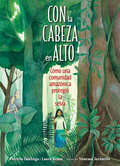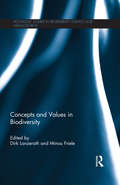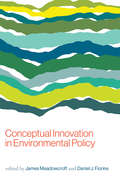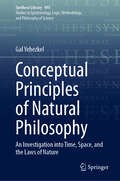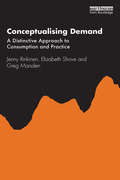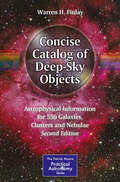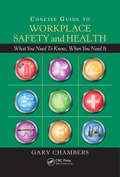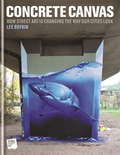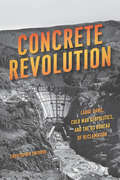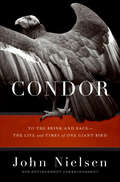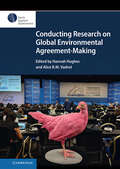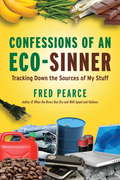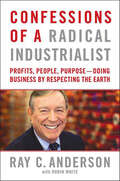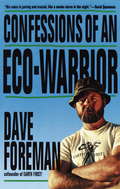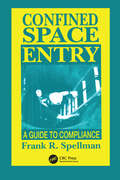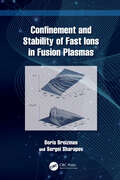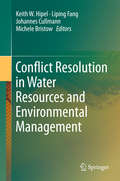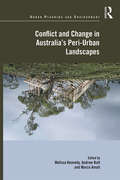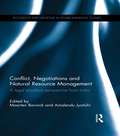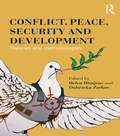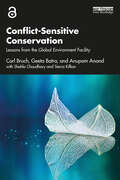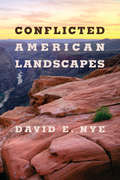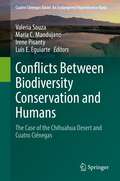- Table View
- List View
Con la cabeza en alto: Cómo una comunidad amazónica protegió la selva
by Laura Resau Patricia GualingaUna inspiradora historia real sobre cómo una activista trabajó en la Amazonía con otras comunidades indígenas para proteger y preservar sus tierras y selvas sagradas.An inspiring true story about how an activist in the Amazon worked with other Indigenous communities to protect and preserve their sacred lands and forests.Patricia (Paty) Gualinga creció en su aldea kichwa, en la Amazonía ecuatoriana, donde seres míticos llamados Amazangas ayudan a proteger la selva. Debido a los estudios, Paty dejó su hogar hasta que se vio obligada a regresar. En la búsqueda de petróleo, compañías que afirmaban que el gobierno les había vendido propiedades estaban destruyendo las tierras del pueblo de Paty. La comunidad kichwa trabajó junto con otros grupos indígenas para llevar al gobierno ecuatoriano ante la Corte Interamericana de Derechos Humanos.Esta emotiva historia, de narrativa poética y bellas ilustraciones, recordará a los lectores la importancia de conservar la naturaleza, ser perseverantes y alzarse en defensa de uno mismo y de la comunidad.Patricia (Paty) Gualinga grew up in her Kichwa village in the Amazon of Ecuador where mystical beings called Amazanga help protect the forest. Paty traveled away from home for school until she was called back—companies that said the government sold them property were destroying her people&’s lands to look for oil. The Kichwa community worked with other Indigenous groups to bring the Ecuadorian government to the Court of Human Rights.Lyrically told and beautifully illustrated, this moving story will remind readers of the importance of nature conservation, perseverance, and standing up for your community.
Concepts and Challenges: Environmental Science
by Leonard Bernstein Martin Schachter Alan Winkler Stanley WolfeTextbook about environmental science for teens.
Concepts and Values in Biodiversity (Routledge Studies in Biodiversity Politics and Management)
by Dirk Lanzerath Minou FrieleBiodiversity may refer to the diversity of genes, species or ecosystems in general. These varying concepts of biodiversity occasionally lead to conflicts among researchers and policy makers, as each of them require a customized type of protection strategy. This book addresses the questions surrounding the merits of conserving an existing situation, evolutionary development or the intentional substitution of one genome, species or ecosystem for another. Any practical steps towards the protection of biodiversity demand a definition of that which is to be protected and, in turn, the motivations for protecting biodiversity. Is biodiversity a necessary model which is also useful, or does it carry intrinsic value? Debates like this are particularly complex when interested parties address it from different conceptual and moral perspectives. Comprised of three parts, each complemented by a short introductory paragraph, this collection presents a variety of approaches to this challenge. The chapters cover the perspectives of environmental scientists with expertise in evolutionary, environmental biology, systematic zoology and botany, as well as those of researchers with expertise in philosophy, ethics, politics, law and economics. This combination facilitates a truly interdisciplinary debate by highlighting hitherto unacknowledged implications that inform current academic and political debates on biodiversity and its protection. The book should be of interest to students and researchers of environment studies, biodiversity, environmental philosophy, ethics and management.
Conceptual Innovation in Environmental Policy (American and Comparative Environmental Policy)
by James Meadowcroft Daniel FiorinoConcepts and their role in the evolution of modern environmental policy, with case studies of eleven influential concepts ranging from “environment” to “sustainable consumption.”Concepts are thought categories through which we apprehend the world; they enable, but also constrain, reasoning and debate and serve as building blocks for more elaborate arguments. This book traces the links between conceptual innovation in the environmental sphere and the evolution of environmental policy and discourse. It offers both a broad framework for examining the emergence, evolution, and effects of policy concepts and a detailed analysis of eleven influential environmental concepts.In recent decades, conceptual evolution has been particularly notable in environmental governance, as new problems have emerged and as environmental issues have increasingly intersected with other areas. “Biodiversity,” for example, was unheard of until the late 1980s; “negative carbon emissions” only came into being over the last few years. After a review of concepts and their use in environmental argument, chapters chart the trajectories of a range of environmental concepts: environment, sustainable development, biodiversity, environmental assessment, critical loads, adaptive management, green economy, environmental risk, environmental security, environmental justice, and sustainable consumption. The book provides a valuable resource for scholars and policy makers and also offers a novel introduction to the environmental policy field through the evolution of its conceptual categories.ContributorsRichard N. L. Andrews, Karin Bäckstrand, Karen Baehler, Daniel J. Fiorino, Yrjö Haila, Michael E. Kraft, Oluf Langhelle, Judith A. Layzer, James Meadowcroft, Alexis Schulman, Johannes Stripple, Philip J. Vergragt
Conceptual Principles of Natural Philosophy: An Investigation into Time, Space, and the Laws of Nature (Synthese Library #495)
by Gal YehezkelThis book provides a general framework for understanding nature to revive the philosophical study of nature as a complementary research project to the empirical exploration of nature. It demonstrates that the a priori research of nature is a viable science, by articulating its principles and demonstrating their effectiveness in explaining the most fundamental features of nature – time, space, and its laws. The original contribution of this book is twofold. Firstly, it introduces a unique method for undertaking conceptual analysis. The effectiveness of these tools is demonstrated in exploring the most general and fundamental features of nature. Secondly, it introduces a novel conception of nature – "internal relationalism" – that offers an insight into the structure of nature and its most fundamental features. Thus, it offers answers to some of the most fundamental questions that have plagued philosophers and scientists for millennia, concluding with the question “Why is there something rather than nothing?” This book is of interest to metaphysics, philosophers of science who focus on the foundations of physics, and philosophically-minded physicists, especially those whose research interests include the nature of time and space.
Conceptualising Demand: A Distinctive Approach to Consumption and Practice
by Elizabeth Shove Greg Marsden Jenny RinkinenThis book addresses fundamental questions about the very idea of demand: how is it constituted, how does it change and how might it be steered? Conceptualising Demand focuses on five core propositions: that demand is derived from social practices; that it is made and not simply met; that it is materially embedded and temporally unfolding; and that it is modulated through many forms of policy and governance. In working through these claims, the book weaves concepts from the sociology of consumption, science and technology studies, policy analyses and social theories of practice together with empirical cases and new research into such topics as the rise of refrigerated foods, the emergence of online shopping and the transformation of energy demanding services. This innovative book takes a fresh look at the very idea of demand, a concept that is often taken for granted, but that is vital for scholars and students of energy, mobility, climate change and consumption, and anyone interested in the subject.
Concise Catalog of Deep-Sky Objects: Astrophysical Information for 550 Galaxies, Clusters and Nebulae (The Patrick Moore Practical Astronomy Series)
by Warren H. FinlayThis book is for the amateur astronomer who wants to know about the astrophysical nature of deep sky objects. The information is presented in a concise format and is equally valuable when used as background reading or, alternatively, at the telescope eyepiece. The past decades have seen an unprecedented increase in professional astronomers' understanding of astronomical objects. However, generally this information is contained in journal publications that most amateur astronomers either do not have access to or would find difficult to read. In this book, basic data on each object (e. g. , magnitude, location, distance, age if known) is presented in a way that allows the reader to quickly access the information. This is followed by some remarks that capture the most fascinating astrophysical facts. Although there are thousands of deep sky objects observed by astronomers, only a small number of these are commonly observed by a wide audience. Thus, coverage here is limited to approximately 500 of the most commonly observed objects in the Northern Hemisphere and - an enhancement for the Second Edition - approximately 50 of those in the Southern Hemisphere. These are visible from the southern limits of the United States as well as from the southern continents. Another new feature of the Second Edition is the addition of amateur photographic images of all the Messier objects.
Concise Guide to Workplace Safety and Health: What You Need to Know, When You Need It
by Gary ChambersEvery organization must comply with occupational health and safety regulations. Yet it is frequently unclear which actually apply in a given real-life situation, plus the field is loaded with technical terminology and complicated regulations. Many managers, trainers, even safety and health professionals therefore find it hard to know how to comply,
Concrete Canvas: How Street Art Is Changing the Way Our Cities Look
by Dr Lee BofkinWhat happens when you look at graffiti and street art as unlimited art forms instead of urban phenomena? Concrete Canvas does just that; investigating the media the artists work with, the canvases they work on, the themes that arise through their work, and the way their art redefines the spaces in which it is set.Concrete Canvas is filled with stunning photos of works from new and exciting artists, as well as established names, including Ron English, Phlegm, Daim, Invader and more. It examines how the curation of public space is affecting our cities and moving art into the future. Global Street Art is the largest online archive of street art photography. Here, its founder Lee Bofkin shares some of his best stories of documenting street art, which variously feature big guns, massive dogs and lots of abandoned buildings.
Concrete Revolution: Large Dams, Cold War Geopolitics, and the US Bureau of Reclamation
by Christopher SneddonWater may seem innocuous, but as a universal necessity, it inevitably intersects with politics when it comes to acquisition, control, and associated technologies. While we know a great deal about the socioecological costs and benefits of modern dams, we know far less about their political origins and ramifications. In Concrete Revolution, Christopher Sneddon offers a corrective: a compelling historical account of the US Bureau of Reclamation's contributions to dam technology, Cold War politics, and the social and environmental adversity perpetuated by the US government in its pursuit of economic growth and geopolitical power. Founded in 1902, the Bureau became enmeshed in the US State Department's push for geopolitical power following World War II, a response to the Soviet Union's increasing global sway. By offering technical and water resource management advice to the world's underdeveloped regions, the Bureau found that it could not only provide them with economic assistance and the United States with investment opportunities, but also forge alliances and shore up a country's global standing in the face of burgeoning communist influence. Drawing on a number of international case studies--from the Bureau's early forays into overseas development and the launch of its Foreign Activities Office in 1950 to the Blue Nile investigation in Ethiopia--Concrete Revolution offers insights into this historic damming boom, with vital implications for the present. If, Sneddon argues, we can understand dams as both technical and political objects rather than instruments of impartial science, we can better participate in current debates about large dams and river basin planning.
Condor Comeback (Scientists in the Field Series)
by Sy MontgomerySibert Medalist, National Book Award Honoree, and New York Times best-selling author Sy Montgomery turns her formidable talents to the story of California condors and the scientists who have fought against their extinction in this installment in the award-winning Scientists in the Field series. In April of 1987 the last wild California condor was captured and taken to live in captivity like the other twenty-six remaining birds of its kind. Many thought that the days were over of of this remarkable, distinguished bird that had roamed the skies of North and Central American for thousands of years. Sy Montgomery employs her skill for on-the-ground reporting, shrewd observation, and stunning narrative prose to detail the efforts of scientists, volunteers, and everyday citizens to get California condors back in the wild. In particular, Montgomery profiles employees at the Santa Barbara Zoo who have worked tirelessly to raise abandoned chicks, nurse sick birds back to health, and conduct research that can support legislation to ban what is probably the largest threat to the existence of the wild condor: lead bullets. In turns affectionate and frustrated, hopeful and heartbreaking, Montgomery&’s powerful prose does justice to these ancient, sociable, and elegant creatures. Complete with world-class, full-color photography and helpful sidebars that provide details such as the history of the bird&’s fight back from extinction, the dangers of lead poisoning, and the relationship of condors to the Chumash nation, Condor Comeback is an inspiring story of groundbreaking science, perseverance, and cooperation.
Condor: To the Brink and Back—the Life and Times of One Giant Bird
by John NielsenThe California condor has been described as a bird "with one wing in the grave."Flying on wings nearly ten feet wide from tip to tip, these birds thrived on the carcasses of animals like woolly mammoths. Then, as humans began dramatically reshaping North America, the continent's largest flying land bird started disappearing. By the beginning of the twentieth century, extinction seemed inevitable.But small groups of passionate individuals refused to allow the condor to fade away, even as they fought over how and why the bird was to be saved. Scientists, farmers, developers, bird lovers, and government bureaucrats argued bitterly and often, in the process injuring one another and the species they were trying to save. In the late 1980s, the federal government made a wrenching decision -- the last remaining wild condors would be caught and taken to a pair of zoos, where they would be encouraged to breed with other captive condors. Livid critics called the plan a recipe for extinction. After the zoo-based populations soared, the condors were released in the mountains of south-central California, and then into the Grand Canyon, Big Sur, and Baja California. Today the giant birds are nowhere near extinct.The giant bird with "one wing in the grave" appears to be recovering, even as the wildlands it needs keep disappearing. But the story of this bird is more than the story of a vulture with a giant wingspan -- it is also the story of a wild and giant state that has become crowded and small, and of the behind-the-scenes dramas that have shaped the environmental movement. As told by John Nielsen, an environmental journalist and a native Californian, this is a fascinating tale of survival.
Confessions of An Eco-Sinner: Tracking Down the Sources of My Stuff
by Fred PearceA 2008 Indie Next Pick In Confessions of an Eco-Sinner, Fred Pearce surveys his home and then sets out to track down the people behind the production and distribution of everything in his daily life, from his socks to his computer to the food in his fridge. It’s a fascinating portrait, by turns sobering and hopeful, of the effects the world’s more than six billion inhabitants have on our planet-and of the working and living conditions of the people who produce most of these goods.
Confessions of a Radical Industrialist: Profits, People, Purpose—Doing Business by Respecting the Earth
by Robin White Ray C. AndersonIn 1994, Interface founder and chairman Ray Anderson set an audacious goal for his commercial carpet company: to take nothing from the earth that can't be replaced by the earth. Now, in the most inspiring business book of our time, Anderson leads the way forward and challenges all of industry to share that goal. The Interface story is a compelling one: In 1994, making carpets was a toxic, petroleum-based process, releasing immense amounts of air and water pollution and creating tons of waste. Fifteen years after Anderson's "spear in the chest" revelation, Interface has:-Cut greenhouse gas emissions by 82%-Cut fossil fuel consumption by 60%-Cut waste by 66%-Cut water use by 75%-Invented and patented new machines, materials, and manufacturing processes-Increased sales by 66%, doubled earnings, and raised profit marginsWith practical ideas and measurable outcomes that every business can use, Anderson shows that profit and sustainability are not mutually exclusive; businesses can improve their bottom lines and do right by the earth.
Confessions of an Eco-Warrior
by Dave ForemanA book that will set the course for the environmental movement for years to come, Confessions of an Eco-Warrior is an inspiring ecological call to arms by America's foremost and most controversial environmental activist. "Rude and brilliant. Read it and you will see the future". --William Kittredge.
Confined Space Entry: Guide to Compliance
by Frank R. SpellmanFROM THE PREFACEThis book brings together (in one text) all of the Occupational Safety and Health Administration's regulatory requirements for making safe and proper confined space entries. Because confined space entry is a complicated procedure-and a process that contains inherent risks-those concerned with safety in the work place are constan
Confinement and Stability of Fast Ions in Fusion Plasmas
by Boris Breizman Sergei SharapovThis book explores the physics of fast ions and fast ion- driven instabilities. It also describes modern theory of near- critical nonlinear wave– particle systems with the particle source and wave damping. Such a theory was developed by H.L. Berk and B.N. Breizman in the mid- 1990s, and it delivered outstanding results successfully explaining the experimentally observed collective phenomena driven by energetic ions.A systematic and step-by-step analysis of resonant interactions between the waves in plasmas and various types of energetic ion populations is presented and analyzed, taking the readers on an exciting journey into the world of nonlinear physics and cutting-edge experiments performed on the world’s major magnetic fusion machines.The phenomena described in this book will be of interest for researchers studying fusion, solar plasma, space plasma, and for a broader realm of scientists working in nonlinear phenomena.Key Features: Features experimental data and the Berk-Breizman theory on nonlinear evolution of energetic particle-driven waves Describes in simple terms, the recent advances in the diagnostics of energetic particles and Alfvén waves Presents a systematic overview of extrapolating results presented in other types of plasmas (e.g., solar and space) and nonlinear systems.
Conflict Resolution in Water Resources and Environmental Management
by Keith W. Hipel Liping Fang Johannes Cullmann Michele BristowThe latest developments regarding the theory and practice of effectively resolving conflict in water resources and environmental management are presented in this book by respected experts from around the globe. Water conflicts are particularly complex and challenging to solve because water and environmental issues span both the societal realm, in which people and organizations interact, and the physical world which sustains all human activities. For instance, when large-scale water diversions take place across political jurisdictions, conflicts may ensue among stakeholders within and across regions, while the water transfers may cause severe damage to sensitive ecological systems. Therefore, to arrive at realistic and fair resolutions, one must take into account not only the economics and politics of the situation but also the water quantity and quality changes that may occur within the altered hydrological system as well as the ecosystems contained therein. When the effects of climate change and the closely connected activities of energy production and usage are also considered, the complexity of the problem becomes even greater and messier. Accordingly, one must adopt an integrative and adaptive approach to water and environmental governance that specifically recognizes the conflicting value systems of stakeholders, including nature and future generations even though they are not present at the bargaining table. The 16 chapters in this leading-edge book are written by authors who presented their original research at the International Conference on Water Resources and Environment Research (ICWRER) 2013, which was held in Koblenz, Germany, from June 3rd to 7th, 2013, and subsequently submitted expanded versions of their research for review and publication in this timely book. The rich range of contributions are put into perspective in the first chapter and then categorized into four main interconnected parts: Part I: Management and EvaluationPart II: Global, Trans-boundary and International Dimensions Part III: Consensus-building, Bargaining and Negotiation Part IV: Ecological and Socio-economic Impacts
Conflict and Change in Australia’s Peri-Urban Landscapes (Urban Planning and Environment)
by Melissa Kennedy Andrew Butt Marco AmatiIn an era of rapid urbanization, peri-urban areas are emerging as the fastest-growing regions in many countries. Generally considered as the space extending one hundred kilometres from the city fringe, peri-urban areas are contested and subject to a wide range of uses such as residential development, productive farming, water catchments, forestry, mineral and stone extraction and tourism and recreation. Whilst the peri-urban space is valued for offering a unique ambiance and lifestyle, it is often highly vulnerable to bushfire and loss of biodiversity and vegetation along with threats to farming and food security in highly productive areas. Drawing together leading researchers and practitioners, this volume provides an interdisciplinary contribution to our knowledge and understanding of how peri-urban areas are being shaped in Australia through a focus on four overarching themes: Peri-urban Conceptualizations; Governance and Planning; Land Use and Food Production; and Solutions and Representations. Whilst the case studies focus on Australia, they advance a variety of tools useful in discerning processes and impacts of peri-urban change globally. Furthermore, the findings are instructive of the issues and tensions commonly encountered in rapidly urbanizing peri-urban areas throughout the world, from landscape valuation and biosecurity concerns to functional adaptation and social change.
Conflict, Negotiations and Natural Resource Management: A legal pluralism perspective from India (Routledge Explorations in Environmental Studies)
by Maarten Bavinck Amalendu JyotishiConflicts over natural resources abound in India, where much of the population is dependent on these resources for their livelihoods. Issues of governance and management are complicated by the competing claims of parallel legal systems, including state, customary, religious, project and local laws. Whereas much has been written about property rights, this unique collection takes a legal anthropological perspective to explore how the coexistence and interaction between multiple legal orders provide bases for claiming property rights. It examines how hybrid legal institutions have developed over time in India and how these impact on justice in the governance and distribution of natural resources. The book brings together original case studies that offer fresh perspectives on the governance of forests, water, fisheries and agricultural land in a diverse range of social and spatial contexts. This brand new research provides a timely and persuasive overview of the fundamental role of parallel legal systems in shaping how people manage natural resources. It will be of interest to scholars and practitioners of environmental law, property law, environmental politics, anthropology, sociology and geography.
Conflict, Peace, Security and Development: Theories and Methodologies
by Dubravka Zarkov Helen HintjensWhilst classical approaches linked development with peace, security has become central to understandings of both war and peacetime. This book uniquely reflects on how to deal with the convergence of war and peace in the context of global economic and geo-political development. It addresses methodological challenges in contemporary approaches to conflict, violence, security peace and development. Two dominant contemporary approaches are selected for debate on methodologies and ethical choices: rational choice and identity-based theorizing. The chapters are arranged as dialogues around contending approaches, to better understand how the inter-locking fields of violent conflict, peace, development and security can be researched and understood. The book considers how theoretical and methodological approaches relate to different ethical and political choices, including around engagement and intervention in the four interwoven fields. Theoretical, methodological and ethical issues emerge from the critical reviews of academic discourses and case-study based chapters from across the world, including Sri Lanka, Ghana, Colombia and Rwanda. This book is an invaluable resource for postgraduate students and researchers in Development Studies, Conflict Studies, Peace Studies and Security Studies.
Conflict-Sensitive Conservation: Lessons from the Global Environment Facility
by Carl Bruch Geeta Batra Anupam Anand Shehla Chowdhury Sierra KillianThis book provides an empirically formulated foundation for conflict-sensitive conservation, a field in which the existing literature relies primarily on anecdotal evidence. Seeking to better understand the impact of conflict on the implementation and outcomes of environmental projects, the Global Environment Facility (GEF) Independent Evaluation Office and the Environmental Law Institute undertook an evaluation of GEF support to fragile and conflict-affected contexts. Following a qualitative and quantitative analysis of documents from more than 4,000 projects, the research team discovered a statistically significant negative correlation between a country’s Fragile States Index score and the implementation quality of environmental projects in that country. In this book, the evaluation and research team explain these groundbreaking findings in detail, highlighting seven key case studies: Afghanistan, Albertine Rift, Balkans, Cambodia, Colombia, Lebanon, and Mali. Drawing upon additional research and interviews with GEF project implementation staff, the volume illustrates the pathways through which conflict and fragility frequently impact environmental projects. It also examines how practitioners and sponsoring institutions can plan and implement their projects to avoid or mitigate these issues and find opportunities to promote peacebuilding through their environmental interventions. Examining data from 164 countries and territories, this innovative book will be of great interest to students and scholars of environmental management, conservation, international development, and the fast-growing field of environmental peacebuilding. It will also be a great resource for practitioners working in these important fields.
Conflicted American Landscapes
by David E. NyeHow conflicting ideas of nature threaten to fracture America's identity.Amber waves of grain, purple mountain majesties: American invest much of their national identity in sites of natural beauty. And yet American lands today are torn by conflicts over science, religion, identity, and politics. Creationists believe that the Biblical flood carved landscapes less than 10,000 years ago; environmentalists protest pipelines; Western states argue that the federal government's land policies throttle free enterprise; Native Americans demand protection for sacred sites. In this book, David Nye looks at Americans' irreconcilably conflicting ideas about nature.A landscape is conflicted when different groups have different uses for the same location—for example, when some want to open mining sites that others want to preserve or when suburban development impinges on agriculture. Some landscapes are so degraded from careless use that they become toxic &“anti-landscapes.&” Nye traces these conflicts to clashing conceptions of nature—ranging from pastoral to Native American to military–industrial—that cannot be averaged into a compromise. Nye argues that today&’s environmental crisis is rooted in these conflicting ideas about land. Depending on your politics, global warming is either an inconvenient truth or fake news. America&’s contradictory conceptions of nature are at the heart of a broken national consensus.
Conflicts Between Biodiversity Conservation and Humans: The Case of the Chihuahua Desert and Cuatro Ciénegas (Cuatro Ciénegas Basin: An Endangered Hyperdiverse Oasis)
by Valeria Souza Luis E. Eguiarte Irene Pisanty María C. MandujanoThis book takes readers on a journey through the history of water in the Coahuila desert. It starts by describing the beauty and mysteries of the landscape, and then explores the rock art of the original desert cultures in Coahuila, offering readers a glimpse of the sacred nature of water in the desert, as well as the rituals surrounding it. Moving on to the colonial times and the post- independence development of the region, it discusses early water management, and explores how water is managed in modern times, as well as the legal complications of the law, and how these faulty laws, designed for less arid regions, have affected a highly diverse wetland, the Cuatro Ciénegas oasis. The book then examines the biological consequences of the water loss for the aquatic plants and animals in Churince – a now extinct system within Cuatro Ciénegas. Further, it addresses how even bacteria can become extinct in this hyper-diverse microbial oasis. Lastly, after this despair and sense of loss, the book provides hope, offering suggestions for how we can transform the future, from a social and educational point of view as well as through good science and changes in policy.
